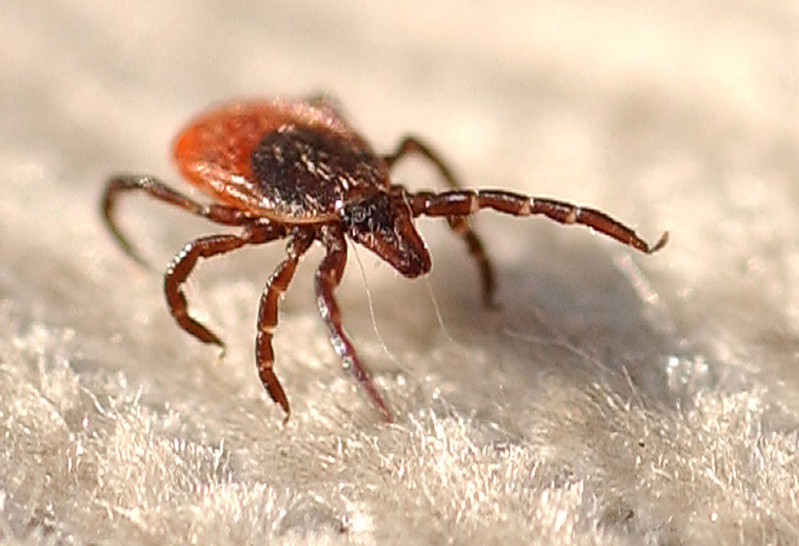Lyme disease is easy to avoid and when caught easy to treat, according to medical experts. That’s what Dr. Dora Mills at the Maine Center for Disease Control and Prevention says.
However, Mainers who have had long-term problems as a result of having Lyme disease describe it as life-altering. They are outdoors people, folks who still hike and sit out at their lake camps. But make no mistake, they’re not lackadaisical about Lyme. It’s safe to say some are pretty scared.
Two weeks ago the Maine CDC reported 50 cases of Lyme disease in Maine in January and February, up from an average of 15 for the two months the past five years. Mills said the vast majority of cases in Maine are detected early and treated early.
“Even though Lyme is on the rise I think it’s on people’s radar. Not to minimize it. It can be more serious. Somehow it seems there are reports of people with it for a very long time, but the vast majority fully recover,” Mills said.
But Mainers who have Lyme disease, or who have family members fighting it, often tell a different story.
Dave Hauser in Scarborough never saw a tick on his body. Yet he got the classic “bull’s-eye” rash that can appear after a bite from a deer tick, according to the CDC.
So Hauser was proactive and sought treatment right away. He still had debilitating symptoms for a year.
“I got the rash and figured that was indicative that I had been bitten and that it hadn’t been very long into the process. I took antibiotics for a couple of weeks. But I think truthfully they missed the boat and took me off antibiotics and it didn’t kill it. Each time it reared its head and got worse,” Hauser said.
Every three to four months when symptoms came back, Hauser said he was put on another round of antibiotics for two weeks, and the symptoms eventually would go away but then return: bouts of vertigo, headaches, nausea, chronic fatigue and unmanageable joint pain. Through repeated rounds of antibiotics, along with physical therapy, Hauser thinks he’s recovering, after a year.
Hauser has a hot tub business based in Scarborough. His work takes him into people’s backyards around high grass and shrubs. Now he checks himself for ticks all the time and uses DEET.
“Some doctors just think you’re in for painkillers. For me, that couldn’t be furthest from the truth. I had to have something each night to dull the pain so I could sleep,” Hauser said. “It’s bad. It’s really, really bad.”
In the past two years in Maine there were about 900 reported cases a year. Mills said the majority of patients were diagnosed, treated and recovered. That kind of rapid response is due to a widespread understanding of the disease, Mills said.
“Our health-care providers are much more aware of it,” Mills said. “There is increased awareness among health-care providers and I think the result is the vast majority that have reports are getting detected early and treated early.”
However, once again, Lyme disease victims tell a different story.
Hauser found treatment in Maine — but only after going through five doctors.
And Steve Sullivan’s eldest son, Joe, was at the University of Tampa when he was diagnosed with Lyme disease two years ago. He sought treatment in Maine but ended up finding a doctor who would treat him with prolonged doses of antibiotics in Burlington, Vt.
Now Joe Sullivan is spending a year traveling through South America while he takes long-term doses of antibiotics to try to rid his body of the disease that has left him weak and fatigued.
“He didn’t have the bull’s-eye rash but he has chronic fatigue. With his workload at college, he just thought it was him staying up late,” said Steve Sullivan of South Portland.
“We have a camp at Moosehead Lake, we live in the woods. Now we shake out our kids when they come out of the pond. We’re scared to death.”
Staff Writer Deirdre Fleming can be contacted at 791-6452 or at:
dfleming@pressherald.com
Send questions/comments to the editors.




Success. Please wait for the page to reload. If the page does not reload within 5 seconds, please refresh the page.
Enter your email and password to access comments.
Hi, to comment on stories you must . This profile is in addition to your subscription and website login.
Already have a commenting profile? .
Invalid username/password.
Please check your email to confirm and complete your registration.
Only subscribers are eligible to post comments. Please subscribe or login first for digital access. Here’s why.
Use the form below to reset your password. When you've submitted your account email, we will send an email with a reset code.